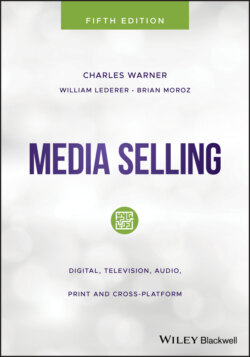Читать книгу Media Selling - Warner Charles Dudley - Страница 26
2 Selling in the Digital Era
ОглавлениеCharles Warner
What Changed?
Digital‐Era Media Are Still “The Media”
New Assumptions for the Digital Era
Approaches
Mission, Objectives, Strategies, and Tactics
Types of Selling
Chapter 1 covered the Internet’s and Google’s disruption of the marketing/advertising/ media ecosystem. The Internet also disrupted the way media salespeople sell advertising. In his book Googled: The End of the World As We Know It, Ken Auletta writes about a July, 2003, meeting in Google’s Mountain View, CA offices with Viacom’s CEO Mel Karmazin and Google’s Larry Page, Sergey Brin, and Eric Schmidt, then CEO of Google.
“Karmazin was among the first major executives from the old media to visit its headquarters. As CEO of Viacom, he represented the world’s then fourth largest media company – the owner of the CBS network, of TV and radio stations, Paramount Studios, MTV and sister cable networks, Simon & Schuster publishers, Blockbuster video, and an outdoor advertising concern, among other holdings,” Auletta wrote.1
During the meeting, the Google executives told Karmazin how the self‐serve online second‐price auction system worked – no advertising salespeople, no negotiating, and no relationships.i But what appalled Karmazin the most was the cost‐per‐click (CPC) pricing model that ensured that “advertisers were only charged when the user clicked on an ad.”2 It was Google’s ambition, the founders and Schmidt liked to say, to provide an answer to Wanamaker’s complaint that half his advertising was wasted. Therefore, Google offered their advertisers a free online tool called Google Analytics, which allowed them to track on a daily basis how many clicks and how many sales their search advertising produced, which meant they could easily calculate a return‐on‐investment (ROI) for their advertising.3
Karmazin’s CBS salespeople sold advertising based on the theory that advertisers “paid their money and took their chances.”4 Advertisers did not know if their ads were going to work, and salespeople sold on the basis of emotions, relationships, and scarcity, not return‐on‐investment (ROI) metrics. However, the Google executives thought they could design a better system, one that was measurable and fair to all advertisers, not just to big advertisers. Karmazin could not believe what he heard from the Google executives, and he said, half in jest, to paraphrase his actual words, that they were messing (not his actual word) with the magic!5
Indeed, Google’s AdWordsii was not magic, it just reaffirmed how the Internet had disrupted advertising, marketing, the media, and the fundamentals of all media businesses, as indicated in Chapter 1 in the discussion of the value chain and aggregation theory.
